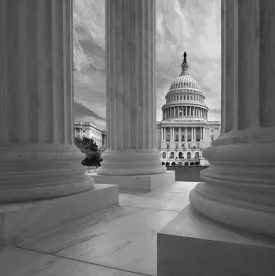Third Relief Bill Expected in Coming Days
On March 6, President Trump signed into law the Coronavirus Preparedness and Response Supplemental Appropriations Act, which provides $8.3 billion in emergency funding for federal agencies to respond to the coronavirus outbreak.
Recent developments involving the spread of COVID-19 have continued to affect congressional and administration efforts on a legislative response, which is changing almost by the hour. Last Thursday, the Capitol building and House and Senate offices buildings closed to the general population, only allowing access for Members, staff and official business visitors. Many offices have implemented telework requirements for staff.
Treasury Secretary Mnuchin, House Speaker Nancy Pelosi (D-CA) and other administration officials and congressional leaders earnestly worked over the last few days to reach a compromise on a second legislative package. That package, the Families First Coronavirus Response Act (H.R. 6201), passed the U.S. House early Saturday morning by a vote of 363 to 40. It is possible that the House will make additional changes to the bill by unanimous consent before sending it to the Senate. The U.S. Senate has cancelled a scheduled recess period to stay in town and consider the legislation.
Additionally, it is anticipated that there will be yet another (third) relief package that could include longer-term relief and could incorporate assistance for various industries impacted by the virus, including the airlines and hotels, and possible infrastructure and tax provisions.
The House-passed legislation, H.R. 6201, would do the following:
-
Require two weeks of paid sick leave for individuals affected by the virus, paid by employers with fewer than 500 employees and partially offset by a refundable tax credit for employers that counts against Social Security taxes paid.
-
Require employers with fewer than 500 employees to pay for two weeks of leave at the regular rate of pay, and an additional ten weeks of leave at two-thirds the rate of pay, for employees affected by closings or caregiver responsibilities, including caring for family members who are sick or at risk or for children unable to attend school or childcare; these expenses will also be partially offset by a refundable tax credit for employers that counts against Social Security taxes paid.
-
Provide $1 billion for emergency grants as well as interest-free loans to assist with unemployment insurance.
-
Provide $500 million for Women Infants and Children (WIC) for those who are laid off due to the virus.
-
Provide $400 million for The Emergency Food Assistance Programs (TEFAP).
-
Provide $250 million for additional home-delivered meals for low-income seniors.
-
Provide assistance for children to access school lunches during school closures.
-
Halt work requirements for the Supplemental Nutrition Assistance Program (SNAP).
-
Require private insurers, Medicare Advantage, Medicare Part B, Tricare, veterans’ coverage, and federal civilians’ coverage to fully cover various health care expenses related to COVID-19.
-
Require Medicaid and CHIP to cover COVID-19 testing.
-
Provide states with the option to furnish Medicaid coverage to uninsured populations.
Within the White House, the president announced on Friday an emergency declaration under the 1988 Stafford Act to provide billions of dollars in funding to counteract the impact from the virus. Among other things, the declaration is expected to include funding for small business loans and assistance to hourly workers. The president has also indicated support for cutting the Social Security payroll tax through the end of 2020, although there appears to be limited support for that among congressional leaders.
So, we are awaiting the next moves by Congress to pass this second package. And as noted above, we also expect a third, broader economic package that could include infrastructure and tax provisions to move in the next few days. COVID-19 will continue to be a hot topic in Washington for the foreseeable future.



 />i
/>i

